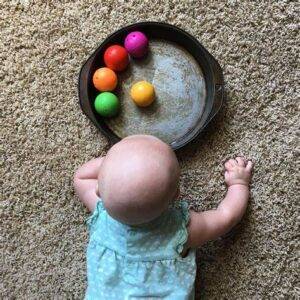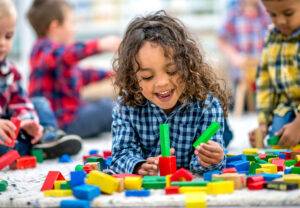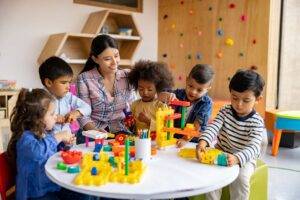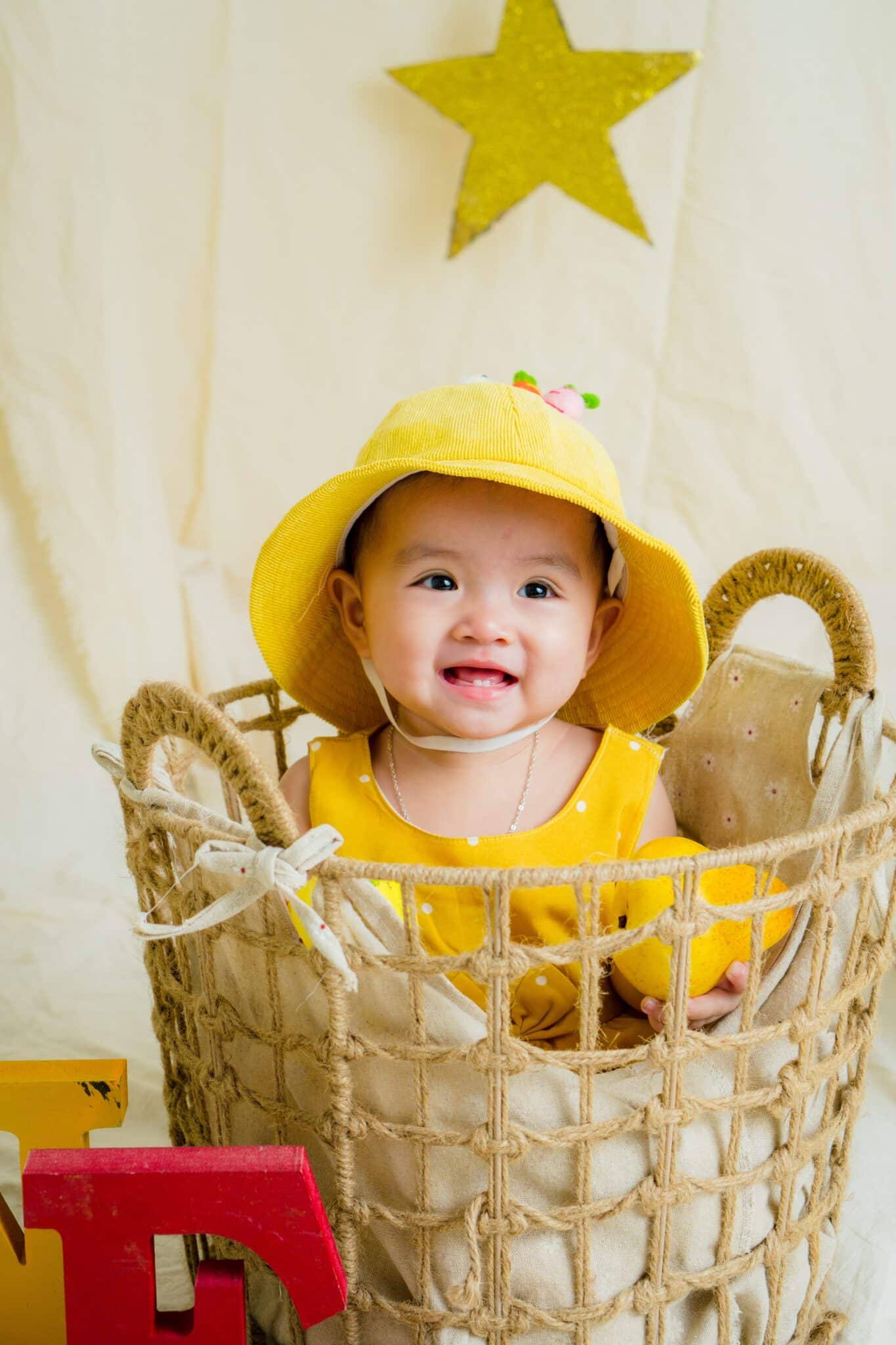Encouraging your children to play is not only something that you can do to keep them busy for hours. You are also helping them learn new things and develop certain skills.
Yes, it’s true! Playtime is important for your baby’s development. It enables them to enhance their cognitive, motor, and social abilities, fostering a strong bond between you and your child.
We at Omega Pediatrics recognize that playtime is an essential ingredient to boost your baby’s development and proper growth, especially during their formative years. So, on this page, let’s explore the remarkable advantages of playtime for your little one!
Types of Play for Baby’s Development
While many people think that playing just keeps kids entertained, it does more than that. It helps your baby reach milestones! If you think that there’s only one type of play, then you may be surprised to find out otherwise.
Below are the different types of play based on what your baby can develop by engaging in them:
Sensory Play
This involves stimulating a baby’s senses, such as touch, sight, sound, and smell, which help with brain development and coordination. The baby plays with different textures like water, sand, and play dough.
This type of play also includes listening to music and sounds that appeal to the sense of hearing.
Gross Motor Play
These are activities that help develop large muscle groups for crawling, walking, and running. Other examples are playing with balls, climbing, and dancing. All these promote physical fitness and balance for your baby’s development.
Fine Motor Play
These activities develop small muscle groups, such as those in their hands and fingers. The baby plays with blocks, drawing, and threading to help develop hand-eye coordination and dexterity.
Imaginative Play
In terms of baby’s development, this type of play allows a baby to explore and express their creativity and imagination, such as by playing dress-up, pretending to cook, and playing with dolls or action figures. These support social-emotional development.
Types of Play According to Activity
It’s important to incorporate different types of play into your daily routine to support your baby’s development and overall growth. These are types of play if you categorize them based on how they’re done.
Using Toys
Toys are not only there to bring fun; rather, they’re also designed to help older kids learn new things and explore, and they’re also designed to boost a baby’s development.
Toys and object play are a great way for babies to use their sensory-motor skills and conduct their own little “experiments.” And as they grow into preschoolers, toys can also help them develop abstract thinking and concepts like symbolism.
Physical Play
These refer to activities such as running around the playground or playing games of tag that are necessary for building motor skills and preventing childhood obesity. It also helps build emotional intelligence and confidence.
Outdoor Play
This is especially important since it engages all the child’s senses and helps build skills like spatial awareness and balance. Plus, spending time outside can improve their attention span! All these contribute to a baby’s development.
It’s a shame that many US kindergartens no longer have recess. Studies show that children in countries where schools allow more time for recess see more academic success as they get older.
Pretend Play
These activities let your child experiment with different social roles and learn to cooperate with others. Dressing up and using their imagination encourages creativity and builds more complex communication and language skills.
It’s Playtime! Age-Specific Play Ideas
From Birth to 6 Months
At this age, your baby is just starting to explore the world around them. You can encourage a baby’s development by:
- Smiling and eye contact build their social-emotional skills.
- Imitating sounds and having interactive “conversations” encourage language development.
- Showing interesting objects and letting them explore with their hands and mouths.
- They vary their positioning so they can see the world from different angles.
Between 7 and 12 Months

When your baby begins to crawl and discover new things, you can help the baby’s development by:
- Creating a setting conducive to playing and exploring gives them toys that let them learn cause and effect.
- Using a mirror to show their facial expressions.
- Playing games like peek-a-boo.
Between 1 and 3 Years Old
Toddlers love to play and learn through exploration. You can encourage a baby’s development by:
- Giving simple objects to play with, like blocks, empty containers, and puzzles.
- Encourage make-believe play and pretend with your child.
- Reading books together and encouraging pretend play based on the stories
- Singing songs and playing rhythm games like Simon Says.
- Letting your child play with peers.
Between 4 and 6 Years Old
As your child gets older, they try more complex activities. You can help the baby’s development by
- Singing and dancing together or engaging in imaginative play.
- Tell stories, then ask your child what they remember.
- Encourage them to act out imaginary scenes and roles.
- Schedule playdates with friends to practice socializing.
- Encourage varied movements like hopping, swinging, climbing, and somersaults.
Play with your children to foster their development. The time spent playing with them nurtures your relationship and helps them later in life, particularly when dealing with their emotions.
What are the Essential Toys for Playtime?
Choosing the right toys for your baby can be overwhelming. Some toys promote different types of play and help with your baby’s development.
Sensory Toys
These toys help children explore their senses, such as touch, sight, and hearing. There are toys in different shapes, sizes, and textures that stimulate the brain and improve the cognitive and motor skills necessary for a baby’s development.
Next time you buy a toy, reach out for rattles, textured balls, and soft toys with different fabrics. Trust us, your baby will love it!
Toys for Exploring and Problem-Solving
These toys challenge your baby’s mind to develop cognitive abilities, hand-eye coordination, and motor skills. Examples are stacking cups, shape sorters, and activity centers with buttons, knobs, and levers.
Toys for Imaginative Play
These toys promote your child’s creativity, helping them develop social and emotional skills such as empathy, communication, and cooperation. Dolls, play kitchens, and stuffed animals are examples.
Encouraging your baby’s natural urge to play helps them learn new things around them. There are many toys to choose from, but the important thing is that the child appreciates them. Hence, get toys suitable for their age—all while having fun.
Buying Toys: Helpful Tips
With their attractive colors and shapes, parents and kids alike get easily overwhelmed by the sight of toys on the shelves of baby stores and play stores. However, we may need to be mindful of what toys we choose for our kids.
1. Choose toys according to your baby’s age.
Consider the baby’s age and developmental stage. It should be appropriate for their age and skill level. For example, toys with small parts can be a choking hazard for young babies.
2. Choose toys according to your baby’s interests.
You know your baby best, which means you also know what they like or what captures their attention. For example, if your baby loves playing with blocks, consider buying more block sets.
3. Choose toys that have educational value.
Since toys play a significant role in your baby’s development, choose those that encourage learning. These stimulate their senses with bright colors, different textures, and sounds.
4. Choose toys that promote physical activity.
Choose toys that encourage movement to help develop their gross motor skills, such as balls, push toys, or ride-on toys. After all, physical activity is crucial for your baby’s development.
5. Choose toys that are safe and durable.
Safety is a top priority. Always check the packaging and labels for any potential hazards, such as sharp edges, loose parts, or toxic materials. Also, it should be long-lasting. Avoid those that can easily break.
6. Don’t buy too many toys.
Yes, it’s tempting to buy every toy you see, but your baby doesn’t need an enormous number of toys. Too many toys can overwhelm your baby, leading to a lack of interest in any particular toy.
How About Do-It-Yourself Toys and Activities?
There are many reasons why you may opt to make toys for your baby instead of buying them. The most common one is money-saving. Here are some easy and inexpensive DIY toy and activity ideas for your baby:
Sensory Bottles
Fill an empty bottle with water, glitter, beads, and other small items that can move around when shaken. Secure the lid with hot glue. Your baby now has a fantastic sensory bottle to play with.
Textured Balls
Cut a hole in a tennis ball, then insert small objects such as bells, beads, or crinkly paper. The different textures and sounds of the ball will be awesome for your little one as they play.
The advantages of homemade toys and activities go beyond saving money. They can also promote creativity and, best of all, encourage bonding between you and your baby. It’s because you involve them in the process of making the toys.
The best part? You can alter your DIY toys as your baby grows. This means that even if they are a couple of years older, they can still pick up the same toy, and it will still be age-appropriate.
Let Your Baby Enjoy Learning While Playing

Encourage your baby to play. They learn and discover while having fun. Toys entice them to get moving; thus, you foster their confidence to learn. After all, toys aren’t just for fun. But rather, it’s also for learning.
Stick to a playtime schedule and spend time with your kids by playing with them. You’ll be amazed at what they can do. It strengthens your bond, and this is something they will remember even when they get older.
Your provider at Omega Pediatrics shares with you the joy of parenting. Playtime is not only about having fun; it’s essential to boost your baby’s development. Provide them with the toys to embrace the power of play in your little one’s life.





